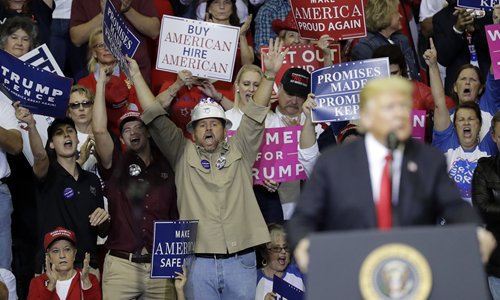HOME >> OPINION
Nationalism on rise in the US under 'America First'
Source:Global Times Published: 2019/11/3 20:33:40

Photo: IC
US-based The National Interest recently published an article - "China's Communist Party Stokes Nationalism at Its Own Risk," saying that "Chinese nationalism is once again on the rise." The article goes, "From the public military spectacle of the October 1 National Day parade to a recent slew of boycotts against foreign firms for their perceived support of Hong Kong protests," the Communist Party of China (CPC) has reinforced "its role as the guardian of the Chinese state by cultivating a renewed sense of a foreign threat."The article betrays US hostility and prejudice toward China. By claiming that the CPC is stirring up nationalist sentiments among Chinese, the US attempts at triggering confrontation between the Chinese public and the Chinese leadership. But the attempt has failed abysmally.
A recent rise in nationalism in China can be explained by historical and practical elements. The year 2019 marks the 70th anniversary of the founding of the People's Republic of China. The country has made remarkable achievements in the past decades especially since reform and opening-up. Living standards have significantly improved and the country's international standing has risen, leading to ascendant national pride.
Besides, a strong sense of patriotism also stems from the painful memory of sufferings in history. The Chinese have been striving to maintain the country's unity and territorial integrity. However, this East Asian country is still on a path to reunification.
Despite being outside the region, the US has repeatedly whipped up tensions on territorial issues between China and countries in its vicinity, even directly meddling in the South China Sea issue. By using what it calls the freedom of navigation, Washington has repeatedly violated China's legitimate rights and interests. Be it on Hong Kong or Taiwan, the US clearly has an antagonistic approach. The Chinese public has become gradually aware of US intentions.
Washington's recent moves such as launching the trade war on China, supporting rioters in Hong Kong and impeding normal people-to-people and academic exchanges are attempts to restrict or contain China's development, making Chinese people resent what the US is doing. Such moves have stirred patriotic sentiments and brought about cohesion within the country.
At a rally in Houston ahead of the midterm elections in October 2018, US President Donald Trump admitted, "I'm a nationalist. Nothing wrong." The Trump administration has been cranking up the "America First" policy, in addition to unilateralism and protectionism. It is the US that has been repeatedly stirring nationalism.
The "America First" doctrine is the leitmotif of US nationalism. It is not wrong for a country to give priority to development to safeguard its own national interests and improve living standards. The US has its rights and needs of development, just as China seeks progress with reform and opening-up.
However, upholding "America First" actually sacrifices other countries' interests and stifles their development. In this context, it is not only nationalism but also populism that is evident in the US; it seeks its own interests and security and thus puts those of others at risk.
In contrast, with its own development and promoting win-win cooperation, China's moves have been benefiting other countries. The China-proposed Belt and Road Initiative is in sharp contrast to selfishness and populism of the US, which have been negatively affecting the world.
US populism has greatly hurt China. Both US protectionism and its crackdown on China have severely damaged the normal development of relations between Beijing and Washington. Such twists and turns in ties between the world's two largest economies have brought uncertainty and instability to the world.
US populism has impaired other countries' interests. By withdrawing from various international organizations and revoking important agreements on arms control, Washington has damaged peace and stability of the world. In addition to targeting China, US protectionism can also be seen in the country's policies on Japan, South Korea, India, Vietnam and the European Union. Pursuing economic interests by trying to contain other countries, the US, with its extreme populist and nationalist mindset, has harmed the world economy and hurt the development of aforesaid countries.
US practices have invited criticism not only from China but also from many other countries, showing US moves go against the people's will.
The article was compiled by Global Times reporter Lu Yuanzhi based on an interview with Su Hao, founding director of the Center for Strategic and Peace Studies at the China Foreign Affairs University. opinion@globaltimes.com.cn
Posted in: VIEWPOINT